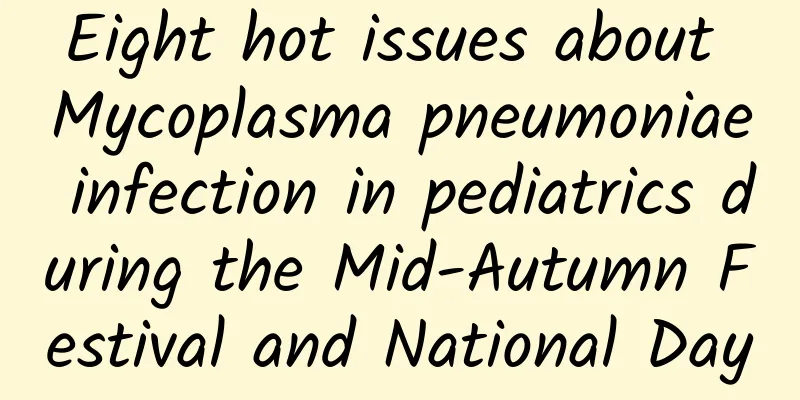Eight hot issues about Mycoplasma pneumoniae infection in pediatrics during the Mid-Autumn Festival and National Day

|
This is the 4589th article of Da Yi Xiao Hu During the Mid-Autumn Festival and National Day in 2023, when the whole country is celebrating, the number of child patients has increased rather than decreased compared with before the double holidays. The pediatric outpatient and emergency waiting areas of major hospitals are as crowded and lively as scenic spots. Pediatricians, nurses and parents of children work together to stick to their jobs, caring for the flowers of the motherland with great love and responsibility, and celebrating the motherland's birthday with their hard work! Most of the children who visited the hospital between October 1 and 5, 2023 were still infected with Mycoplasma pneumoniae with "fever and cough" as the main symptom, and a small number were infected with influenza and hand, foot and mouth disease. When taking their children to the hospital, many parents asked, "My child has a fever and cough. Is it infected with Mycoplasma pneumoniae (MP)?" To answer this question, we need to sort out the following eight questions one by one. 1. What is MP infection? MP is a microorganism without cell wall, between bacteria and viruses. With a diameter of 2 to 5 μm, MP is the smallest prokaryotic pathogenic microorganism. It lacks cell wall and is inherently resistant to antimicrobial drugs that act on cell wall. MP infection is a common cause of community-acquired pneumonia in children, and it is increasing year by year. It is a common pediatric disease in hospitals at all levels. Early detection and reasonable and standardized diagnosis and treatment are key factors affecting prognosis and children's health. MP infection is more common in children over 5 years old, but it can also occur in children under 5 years old, and reports of infants under 1 year old are gradually increasing. 2. How does MP infect the human body and cause disease? The main mechanisms by which MP infects the human body and causes disease are direct damage and immune damage. After invading the respiratory tract, MP uses adhesion organelles to attach to the cell surface and causes direct damage to the respiratory epithelium by releasing oxygen free radicals and toxins. In the process of the human immune system's immune response to resist MP infection, it will be accompanied by abnormal immune responses such as autoimmune reactions, allergic reactions, and immune complex damage. These abnormal immune responses can cause immune damage to the lungs and extrapulmonary tissues. 3. What are the clinical manifestations of MP infection in older children? Older children generally refer to children over 3 years old. MP infection is more common in older children, who are mostly older than 5 years old. The onset is slow, and the fever course is usually 1 to 3 weeks. The poisoning symptoms are mild. However, they can suddenly worsen, with severe fever, rash, dyspnea and other systemic and lung inflammation reactions! The cough is characterized by irritating cough, and a few may present as paroxysmal cough similar to whooping cough. It usually starts 2-3 days after the onset of the disease, with a dry cough in the early stage and a stubborn and severe cough in the later stage, which can last for 1-4 weeks. The clinical features are that the signs found by the doctor during physical examination are milder than the clinical manifestations and imaging examinations. Chest X-ray examinations show various manifestations, which can transform into each other and become migratory changes. 4. What are the clinical manifestations of MP infection in infants and young children? Infants and young children refer to children under 3 years old. After MP infection, infants and young children often have an acute onset, a long course of illness, and a more severe condition. The clinical manifestations are dyspnea, wheezing, and more prominent wheezing, and more lung rales than older children. They are more likely to have a stubborn, severe, irritating cough, more likely to have extrapulmonary complications, and more likely to have mixed bacterial infections. 5. Is there any specific test for diagnosing MP infection? At present, most hospitals can perform MP antibody testing. MP-IgM antibodies generally appear 4-5 days after infection and can be used as a diagnostic indicator for early infection. A positive result indicates MP infection, while a negative result cannot completely rule out MP infection and false positives may occur. The antibody test results must be combined with the child's clinical manifestations and imaging characteristics for a comprehensive analysis. It should be noted that although MP-IgM is the earliest specific antibody to appear when the body is infected with MP, it can usually be detected about 7 days after the onset of the disease, with the peak of positive detection at 10-20 days, and it can turn negative 12-16 weeks after infection. In addition, children with immature immune systems or immunodeficiency often have negative MP-IgM tests. MP culture is the "gold standard" for diagnosing MP infection, but it is difficult to use for clinical diagnosis because it requires special conditions and grows slowly. MP nucleic acid detection, including MP-DNA or MP-RNA detection, has high sensitivity and specificity for early diagnosis of MP infection, but it has not yet been widely used in clinical practice. 6. On what basis do doctors diagnose MP infection? The basis for doctors to diagnose MP infection includes: ① the presence of clinical manifestations of MP infection such as fever, cough, and rash; ② abnormal chest X-ray imaging findings; ③ positive results of specific tests for MP infection such as MP-IgM antibodies. 7.What are the drugs for fighting MP infection? MP is a microorganism without cell wall, between bacteria and viruses. Therefore, cephalosporin antibiotics commonly used by children that act on cell walls are ineffective. Drugs for MP infection include: ① Macrolide antibiotics, including azithromycin, clarithromycin, erythromycin, roxithromycin and acetyl kitasamycin. ② New tetracycline antibiotics, mainly doxycycline and minocycline, are only suitable for children over 8 years old because they may cause yellowing of teeth and enamel hypoplasia. The use of children under 8 years old is considered off-label use, and the pros and cons must be fully evaluated, and the informed consent of the parents must be obtained. ③ Quinolone antibiotics, due to the risk of cartilage damage in young animals and tendon rupture in humans, are considered off-label use for children under 18 years old. The pros and cons must be fully evaluated, and the informed consent of the parents must be obtained. 8. Why do some children with MP infection need to be treated with glucocorticoids? Because the main mechanisms by which MP infects the human body and causes disease are direct damage and immune damage, glucocorticoid treatment targets the pathogenesis of immune damage and is mainly used in children with severe and critical illnesses. Doctors need to make relevant choices by weighing the pros and cons. Author: Qingpu Branch of Zhongshan Hospital Affiliated to Fudan University Pediatrics Chief Physician Xu Lingmin |
Recommend
Why do I get so mad during pregnancy?
Many pregnant mothers may have this feeling, that...
What causes bleeding in early pregnancy?
For a family, children are an important bond, but...
How can women lose weight on their arms?
Every time after the summer, we start to relax ou...
Can pregnant women eat fried rice noodles?
Rice noodles are a popular snack. This snack is a...
Can I eat shiguizi during menstruation?
Menstruation is a normal physiological phenomenon...
What is the whole process of endometrial curettage?
The health of the endometrium is very important f...
Let me show you what are the strong alkaline fruits
We know that our bodies generally have an alkalin...
Should I take vitamin C or vitamin E if I have spots on my face?
Many people know that vitamins are beneficial for...
How to relieve stomach pain in pregnant women
It is normal for pregnant women to have stomach p...
Brown discharge 4 days before period
Generally, women may have brown discharge during ...
How does female breast development occur?
Women with flat breasts are usually called Prince...
How much does a pregnancy glucose tolerance test cost?
The glucose tolerance test is to check whether th...
What disease will you get if you cry during the confinement period?
Confinement after childbirth is still very import...
How to tell if the stratum corneum is thin? What skin care products should I use if the stratum corneum is thin?
Skin problems are a stumbling block for every fem...









